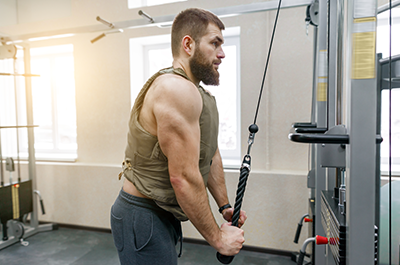Maintaining some sort of workout schedule throughout the year is a great way to live a healthy life. Maybe you are an avid runner, prefer laps in the pool or some yoga. Or maybe you switch up your routine throughout the year. However you choose to stay active, summer can be prime time for workout-related injuries.
On days when temps creep into the 90's, you might be tempted to workout at the same level you do any other day. Brianna Gauna, an athletic trainer for Henry Ford Health, warns against pushing yourself too hard.
“There is a big difference between working out in cooler months and then trying to workout at that same level in the heat,” says Gauna. “It’s hot and you are sweating more meaning you are at greater risk of dehydration, injury or heat exhaustion.”
Here, Gauna identifies some of the season’s biggest workout mistakes and how you can correct them:
- You’re not giving your body time to adjust to the heat. Working out in the heat affects your body differently than during other times of the year. In hot weather, your body temperature rises faster – meaning you are going to tire out quicker. “To avoid risk of injury, make sure to give yourself 7-14 days to acclimate to the heat,” says Gauna. “Once your body is used to how the heat affects you, you’ll find that it is easier to workout in warmer weather.”
- You’re not drinking enough water. When you sweat, your body is sweating out salt. It is essential for you to replace the fluids that you sweat out to avoid dehydration. Start drinking water before your workout and continue to drink it during and after. Don’t wait until you are thirsty to drink water!
- You’re not fueling up properly. Food gives us the energy we need to have a successful workout. “Eat a full, nutritious meal several hours before you plan to work out,” recommends Gauna. “After your workout, once you’ve cooled down and drank some water, make sure to eat within a half hour.”
- You’re wearing the wrong thing. A lot of people think they are going to get more of a workout by wearing layers or heavy clothes that cause you to sweat more. Do not do this! Wearing heavy clothes when it is hot outside can contribute to heat exhaustion. Instead, opt for clothes with less coverage (like tank tops and shorts) to allow for skin sweat absorption. Remember to choose light colors because they reflect the sun and help keep you cool!
- You’re not protecting your skin. No matter how long you plan to workout, don’t forget your sunscreen. It only takes about 15 minutes of sun exposure to cause a sun burn. Make sure to apply before your workout and reapply as needed. You might consider looking for products that are sweat resistant or made for sports.
- You’re pushing yourself too hard. If you find yourself struggling with your normal workout because of the heat, don’t get discouraged. If you can’t keep up, modify your workout until your body is better adjusted to the weather. “Try doing less reps or shorten the length or pace of your run,” says Gauna. “You don’t have to change your routine completely but do listen to your body.” If you scale back on your workout, set goals for yourself to get back to working out at that level.
- You’re scheduling your workouts at the wrong time. When it is hot and humid outside, the last thing you want to be doing is working out in the sun midday. Instead, try working out in the early mornings or late evenings. At these times, the sun isn’t as intense, so it is cooler out and you are more likely to find some shade to rest in.
Protecting Yourself From The Heat
Avoiding factors like dehydration and mid-day workouts can help you decrease your risk for injury, but when it is hot out, there is still a risk of heat exhaustion and heat stroke. Be aware of the symptoms of heat exhaustion so that you can take action:
- Heavy sweating
- Cool, moist skin
- Dizziness
- Cramps
- Nausea
- Feeling sick/feverish
If you start experiencing any of these symptoms, drink water and find shade immediately. You could also use an ice pack or cool towel to try and cool off. But don’t ignore symptoms. Ignoring the signs that your body is overheating can lead to heat stroke. Call 911 immediately, if someone’s symptoms progress to include:
- Red skin
- Lack of sweat
- A bad headache
- Rapid pulse
- Unconsciousness
By taking necessary precautions, it is possible to get a solid workout in throughout the summer – even on the really hot days. Just remember to pay attention to your body. Take breaks when you need to and drink plenty of water.
To find a doctor at Henry Ford, visit henryford.com or call 1-800-HENRYFORD (436-7936).
Brianna Gauna, MA, AT, ATC is the former head athletic trainer for the Detroit City Football Club.



